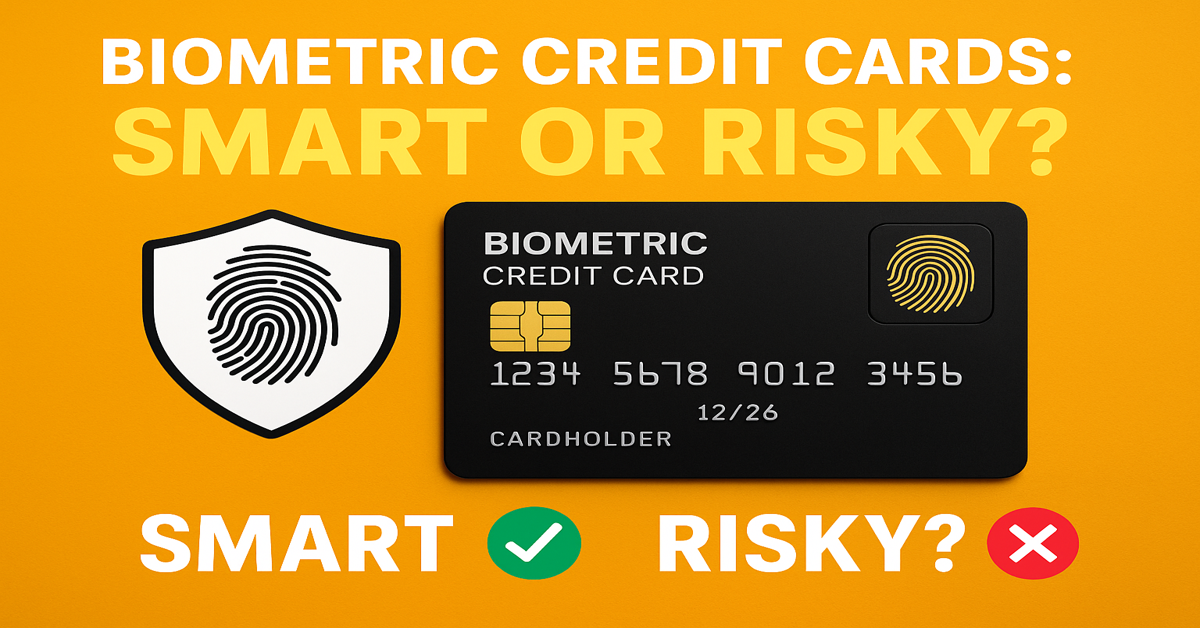Biometric Credit Card Benefits and Risks: Today you find credit cards throughout the digital world yet biometric credit cards remain unfamiliar to many people. Participants can use their face and fingerprint authentication to make transactions through these advanced payment cards. These modern payment options carry potential hazards that accompany their new capabilities. This article evaluates both advantages and potential dangers of biometric credit cards for your consideration. Let’s dive in!
What Is a Biometric Credit Card?
The verification of payments through credit cards happens by using your one-of-a-kind features like your fingerprint or facial recognition. Barely any steps are necessary to pay since fingerprint recognition allows you to complete your payments by simply tapping your finger. The new year shows an uptrend in popularity for biometric payment techniques due to speedier and secure payment solutions.
Next we will examine both advantages and disadvantages which biometric credit cards present.
Benefits of Biometric Credit Cards
1. Top-Notch Security
Biometric credit cards provide maximum security protection to their owners. Your finger print identification guarantees that stolen credit cards remain useless since fingerprints cannot be duplicated. Fingerprints provide superior security because human fingerprints prove impossible for would-be intruders to replicate successfully. Due to their unique identification method biometric credit cards substantially minimize the chance of unauthorized activities and fraud.
2. Fast and Easy Payments
When you shop at stores biometric payments allow you to conduct transactions without PIN-number agonies by simply using your finger. The implementation of Biometric cards increases contactless payment speeds while simultaneously saving you time in transactions. The year 2025 will see this innovation transform payment processes.
3. No More Forgotten Passwords
Everyone has experienced forgetting their PIN at some stage. A biometric card requires users to scan their fingerprints by using its built-in technology for authentication purposes.
4. Future-Proof Technology’
Biometric cards will keep you ahead of digital payments trends when they expand in 2025. A growing number of financial institutions such as HDFC, SBI, and Axis implement this technology which positions it as a top decision for users committed to technological advancement.
5. Eco-Friendly Options
Biometric cards today incorporate eco-friendly materials in their construction to benefit the environment. Banks offering green banking solutions provide you with another benefit you should definitely appreciate.
Risks of Biometric Credit Cards
1. Technology Glitches
A faulty fingerprint scanner or server problem means your ability to make payments can be disrupted by the biometric system. Accessing funds quickly becomes difficult by this method during unexpected emergencies.
2. Privacy Concerns
Your fingerprint is sensitive data. Hacks on banking systems could lead to your biometric data ending up with the wrong entities due to security breaches of the bank or card issuer’s systems. Since fingerprints cannot be modified the way passwords are changed users must consider this dangerous aspect when using them.
3. Higher Costs
The premium technology required to power biometric cards tends to increase their pricing point or result in higher fees than standard payment cards. This payment method exceeds some buyers’ financial reach.
4. Limited Availability
Biometric cards are not supported by all stores and ATMs for the year 2025. Residents of smaller towns and rural areas might be limited to using traditional payment cards together with cash.
5. Learning Curve
Someone who lacks technical expertise will probably find it challenging to operate a biometric card during its initial usage stage. Forging a basic familiarity for the new system might require substantial time and practice.
Are Biometric Credit Cards Right for You?
Your choice to get a biometric credit card depends entirely on the requirements of your lifestyle and personal needs. It’s a great fit if:
-
You enjoy technological devices combined with your preference for rapid safe transactions through payments.
-
Your top priority is quick transactions without needing to remember PINs.
The following points should make you reconsider the idea:
-
Concerns about privacy and data protection worry you.
-
Your location features little to no support for biometric payment cards.
Pro Tip: You should contact your bank about their available options for biometric credit cards. Your favorite bank may be offering free trials and low-fee cards through their 2025 service launch.
The Future of Biometric Credit Cards in 2025
Biometric technology plays a significant role in the world’s fastest-growing digital payment sector within India. The RBI along with banks work to establish safer payment systems by adopting biometric cards which reduces fraudulent activities. The following years will see the development of biometric security systems across all major stores in addition to online platforms. Learning about both advantages and disadvantages of biometric credit cards lets you decide better in your next financial transaction.
Conclusion
Biometric credit cards demonstrate advantages as well as challenges in their benefits and risks spectrum. The combination of outstanding security and fast performance with contemporary payment features comes with the difficulties of limited access and privacy issues. Reach your bank today to find the newest biometric card options currently available for 2025.
Do you feel passionate about using biometric credit cards or does their implementation raise any doubts in your mind? Please share your thoughts through the comment section. And if you’re curious about other ways to make payments smarter, check out our guide on Best Digital Banking Apps for 2025 (#)r.
Author Profile
Braj Verma is a resident of Rajgarh in Madhya Pradesh and is a content writer and freelancer by profession. He has a degree in Political Science from Barkatullah University, Bhopal. He has expertise in subjects like credit cards, banking, loan, insurance, political analysis and digital marketing.

